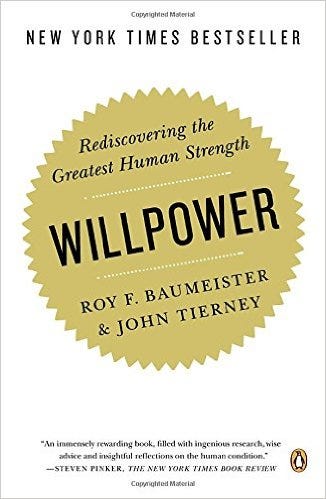Drawing on cutting-edge research, Willpower shares lessons on how to focus our strength, resist temptation, and redirect our lives.

Modern science has given us a better understanding of what willpower is, how it works and where it comes from. It’s closely tied to the brain chemistry and a crucial part of the mind’s functionality.
Willpower is like a muscle
Imagine you “killed it” at the gym and now your legs your legs and arms wobble at every move you make. Your muscles are so exhausted that you can barely brush your teeth. Your Willpower works much the same way.
We have a limited amount of willpower on a daily basis. Any task, even trivial ones like choosing one food over another will contribute to our willpower depletion.
The author realized his own study where he placed participants in a room that smelled of freshly baked cookies. The participants were divided into two groups. One group got to eat cookies, while the other had to eat radishes instead.
The second part of the experiment consisted in geometry puzzles which the participants had to solve. The group which had not used willpower to fight the urge to eat cookies quit on average 12 minutes later than the group which had to use up willpower to resist the cookies.
Many of us face bad decisions due to mental fatigue on a daily basis, for example, people who come home exhausted and get to bicker with their spouse instead of finding compromises.
Train it by using it
Gaining willpower in one are of life can contribute to better decisions in other areas.
In one study people who weren’t, habitual exercisers were given a training plan. By following a simple training plan, their willpower improved in other areas. They became less distracted by television, ate more healthily and completed necessary chores more regularly.
Glucose is linked to willpower
People who have ingested a tasteless sugary concoction perform just as well as individuals who have eaten delicious ice cream, and better than those who performed leisure activities first. This suggests that it is not pleasure (taste) which is responsible for the gain in willpower, but glucose.
Further evidence comes from the fact that people with hypoglycemia (low blood sugar) have a harder time controlling negative emotions or concentrating.
If you want to gain self-control, set the right goals
First, make sure that your goals are compatible with each other. Otherwise, they will be harder to achieve and lead to unhappiness instead of action. Surveys have shown that people who spend time worrying about how to rectify conflicting goals suffer stress and anxiety. Not to mention that they hardly achieve their goals.
Your goals have to be clearly defined but without being overly specific, because being overly specific can deplete your willpower with unnecessary things. One study found that students who plan on a monthly basis perform better than students who plan on a daily basis. This is because monthly plans allow leeway, daily plans are inflexible and exhausting.
The lesson: Beware of the planning cost-benefit tradeoff. Your goals should be clear but not overly specific.
Save willpower by forming habits
Whenever you can form habits, forming habits uses up willpower, but once they are formed they become automatic and help you save willpower. Read more about habits here.
